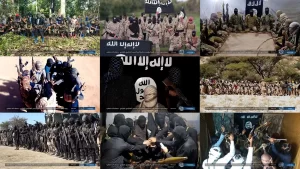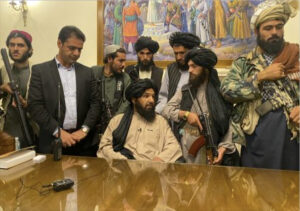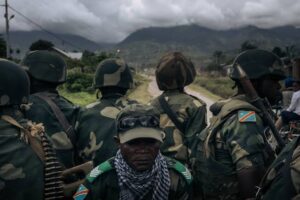
STRATEGIC ASSESSMENT. Islamic State affiliates are active throughout the Sahel and broader West Africa region, with a growing presence in Burkina Faso, Mali, Niger, and Nigeria. Violence has spread to other countries too, including Cameroon, Benin, Ghana, and Togo. Al-Shabaab earns as much as $130 million per year from extortion and other criminal activities in Somalia. U.S. intelligence agencies have assessed that, since American trainers were moved outside of Somalia, al-Shabaab has grown and gained momentum in terms of its ability to operate through larger swaths of the country. Al-Shabaab is among al-Qaeda’s most operationally capable affiliates, boasting as many as 7,000 militants.
The Hasakah prison is believed to house approximately 3,500 prisoners, most of them captured during the final offensive to reclaim territory conquered by ISIS during the height of its so-called caliphate. Overall, there are believed to be more than 12,000 ISIS fighters held in a series of prisons dotting northeast Syria.
ISIS is slowly regrouping in both Iraq and Syria, forming sleeper cells to launch attacks, while maintaining an effective command-and-control to wage a low-level guerrilla insurgency and mobilize new support. The Islamic State is able to conduct asymmetric attacks on civilians and security forces, but can also marshal the resources to launch spectacular attacks intended to destabilize the Iraqi government.

In general, ISIS attacks in Iraq have been far more spread out throughout the country than in neighboring Syria, where attacks tend to be clustered near the eastern side of the Euphrates River Valley.
David Amess, a Conservative member of the British Parliament, was stabbed and killed last week by an individual believed to be motivated by Islamist extremism. Amess was stabbed at a constituency meeting held in Belfairs Methodist Church in the town of Leigh-on-Sea, Essex, 40 miles east of London. The perpetrator, Ali Harbi Ali, a twenty-five-year-old British man of Somali heritage, is being held under the Terrorism Act, with Islamist motivations suspected. Amess’ murder has been labeled a terrorist attack; the murder of politicians by terrorists and extremists is a direct challenge to democracy and to the state itself.

Since March 2017, there have been thirteen separate terrorist attacks in the UK, despite the security services foiling an astonishing 31 attacks during this same period. As in the U.S., the online vitriol directed at politicians in the UK is growing increasingly intense, contributing to a frenzied virtual environment where hatred and threats of violence risk becoming normalized.
According to the Wall Street Journal, MI5 was actively investigating an estimated 3,000 extremists in 600 separate investigations. Furthermore, the security agency also believes that there could be approximately 40,000 people not considered immediate threats, but who could “potentially become active terrorists,” with many not physically based in the UK.
While the Global War on Terror decimated al-Qaeda’s leadership and diminished its ability to attack the West, the organization has proven to be remarkably resilient and strategically adaptive. In the wake of the Arab Spring, al-Qaeda adopted and developed the franchise model, growing its membership by the tens of thousands and expanding its influence from West Africa to the Levant to South Asia.

As al-Qaeda becomes better-positioned to regroup in its former base of operations in Afghanistan, the U.S. cannot afford to divorce counterterrorism from great power competition.
The future of al-Qaeda will depend on the extent to which it can replace talented leaders, capitalize on the U.S. diminishing its focus on counterterrorism abroad in order to shift focus to great power competition and domestic extremism, and exploit the geopolitical and local sectarian tensions on which it thrives.
The Taliban’s conquests in Afghanistan show African jihadist groups that withstanding – and ultimately defeating – superior military forces is possible. The Taliban is still considered too moderate to serve as a model Islamic State affiliate in Africa and possibly some al-Qaeda branches. While al-Qaeda’s affiliate in Mali praised Afghans for their victory, its tone towards the Taliban was unenthusiastic, likely due to perceptions of Taliban “moderation.” Islamic State in West Africa Province is the strongest ISIS affiliate in Africa and already viewed the Taliban as “infidels,” and the group may take pride in IS Khorasan disrupting the Taliban’s rule.

Islamic State Khorasan is in the process of transitioning into a more networked organization and continues to operate training camps and sleeper cells that can be deployed for high-profile attacks around the country.
In addition to al-Qaeda and ISK, there are a number of other terrorist groups active in Afghanistan, including Tehrik-i-Taliban Pakistan (TTP), or the Pakistani Taliban, as well as the Islamic Movement of Uzbekistan (IMU), Islamic Jihadi Group, Jamaat Ansarullah, and remnants of the East Turkestan Islamic Movement/Turkestan Islamic Party (TIP).
The Taliban has shown that a jihadist group can withstand superior foreign military forces and a national government’s counterterrorism efforts for two decades. This resonates with al-Qaeda affiliates, Jamaat Nusrat al-Islam wal Muslimin (JNIM) in the Sahel and al-Shabaab in Somalia. While JNIM has fought a French-backed regional military alliance since 2012, al-Shabaab has fought the African Union Mission to Somalia (AMISOM), the Somali national army, and other foreign militaries since at least 2007. However, JNIM’s leader, Iyad ag Ghaly, is formally loyal to al-Qaeda and the Taliban, while al-Shabaab has expressed praise of the Taliban throughout its history. Some of al-Shabaab’s early leaders trained in Afghanistan in the years surrounding 9/11.

The Taliban have fought against Islamic State militants in Afghanistan and remain at odds with the rival terrorist group. But IS-K fighters were likely freed from prisons along with thousands of other inmates—along with former al-Qaeda fighters—during the Taliban’s rapid advance through Afghanistan. Extremists may have seized heavy weapons and equipment abandoned by Afghan troops, although CENTCOM commander General Kenneth McKenzie suggested that it does not appear that IS-K has MANPAD (man portable air defense systems) capabilities that would pose a serious threat to aircraft. IS-K fighters have a history of waging attacks against soft targets.
Growing defections from Boko Haram offer opportunities for Nigeria’s de-radicalization program to support, prosecute, rehabilitate or obtain intelligence from defectors and civilians. Jihadist defectors have various reasons for handing themselves over to the custody of Nigerian security forces, and these cases must be assessed on an individual basis. Successful de-radicalization and reintegration of Boko Haram defectors could provide incentives for members of other jihadist groups to also consider defecting (TE).





